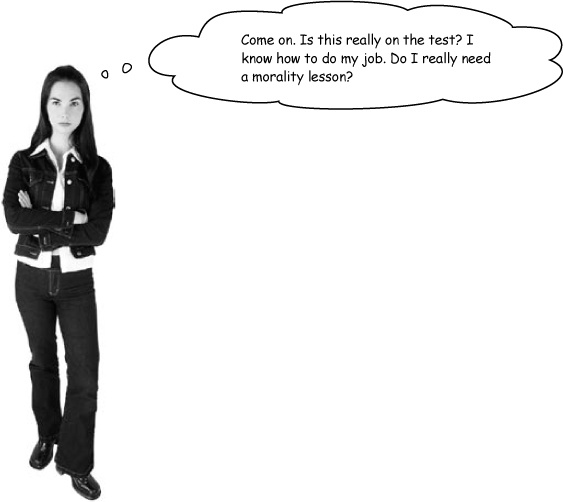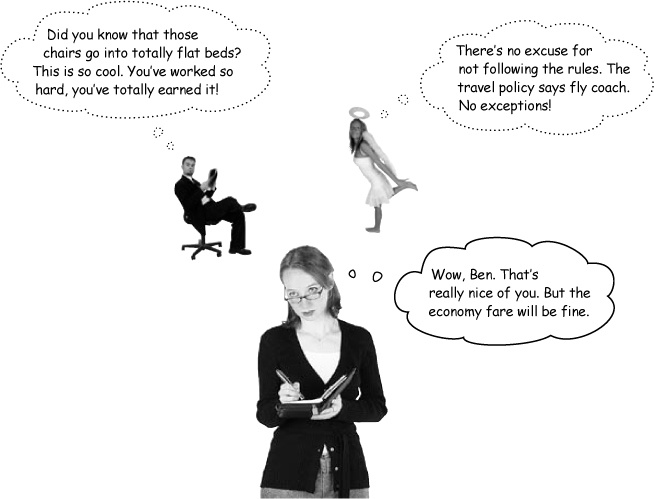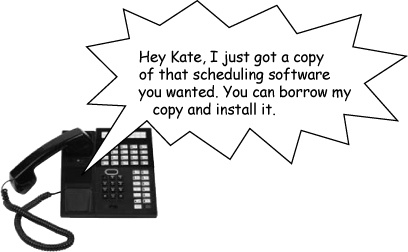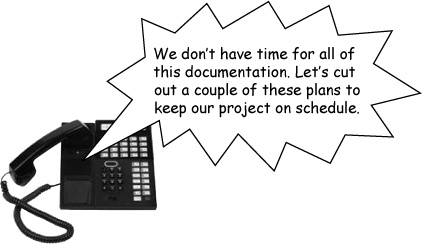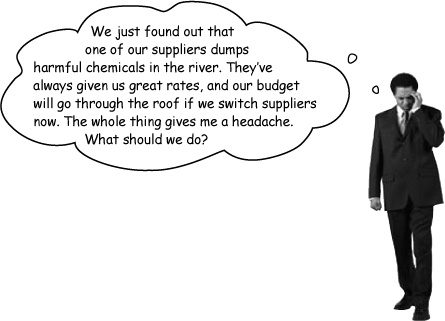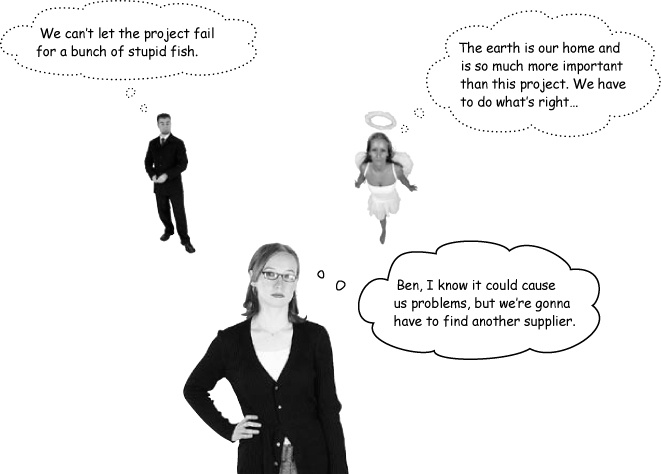Chapter 13. Professional responsibility: Making good choices
It’s not enough to just know your stuff. You need to make good choices to be good at your job. Everyone who has the PMP® credential agrees to follow the Project Management Institute Code of Ethics and Professional Conduct, too. The Code helps you with ethical decisions that aren’t really covered in the body of knowledge—and it’s a big part of the PMP® exam. Most of what you need to know is really straightforward, and with a little review, you’ll do well.
Doing the right thing
You’ll get some questions on the exam that give you situations that you might run into in running your projects and then ask you what to do. Usually, there’s a clear answer to these questions: it’s the one where you stick to your principles. Questions will make the decisions tougher by offering rewards for doing the wrong thing (like money for taking a project shortcut), or they will make the infraction seem really small (like photocopying a copyrighted article out of a magazine). If you stick to the principles in the PMP Code of Professional Conduct regardless of the consequences, you’ll always get the questions right.
The main ideas
In general, there are a few kinds of problems that the code of ethics prepares you to deal with.
Follow all laws and company policies.
Treat everybody fairly and respectfully.
Have respect for the environment and the community you’re working in.
Give back to the project management community by writing, speaking, and sharing your experience with other project managers.
Keep learning and getting better and better at your job.
Respect other people’s cultures.
Respect copyright laws.
Always be honest with everyone on the project.
If you find that another person has done something to damage the PMP credential in any way, you must report them to PMI.
Note
So if you find out that someone has stolen questions from the PMP exam, cheated on the PMP exam, falsely claimed to have a PMP certification, or lied about anything related to the PMP certification process, then you MUST report them to PMI.
Ethics and professional responsibility questions make up 10% of the exam. That’s good news because these questions are really easy if you understand the ideas behind the PMP Code of Professional Conduct.
Being a PMP-certified project manager means that you know how to do your job and that you will do it with integrity.
It might seem like it doesn’t really matter how you will handle these situations, but think about it from an employer’s perspective for a minute. Because of the PMI Code of Ethics and Professional Conduct, they know that when they hire a PMP-certified project manager, they are hiring someone who will follow company policies and do everything aboveboard and by the book. That means that you’ll help to protect their company from litigation and deliver on what you promise, which is actually pretty important.
Keep the cash?
A lot of ethics questions on the PMP exam concern bribery. It is never, under any circumstances, okay to accept a bribe—even if your company and customer might benefit from it somehow. And bribes aren’t always cash. They can be anything ranging from free trips to tickets to a ball game. Any time you’re offered anything to change your opinion or the way you work, you must decline the offer and disclose it to your company.
Fly business class?
Any time there’s a policy in your company, you need to follow it. Even if it seems like no harm will be done if you don’t follow the policy, and even if you will be able to get away with it, you should not do it. And that goes double for laws—under no circumstances are you ever allowed to break a law, no matter how much good it “seems” to do you or your project.
New software
When it comes to copyright, it’s never OK to use anything without permission. Books, articles, music, software... you always need to ask before using it. For example, if you want to use some copyrighted music in a company presentation, you should write to the copyright owner and ask for permission.
Shortcuts
You might see a question or two that asks if you really need to follow all of the processes. Or you might be asked by your boss to keep certain facts about your project hidden from stakeholders or sponsors. You have a responsibility to make sure your projects are run properly, and to never withhold information from people who need it.
A good price or a clean river?
Being responsible to the community is even more important than running a successful project. But it’s more than being environmentally aware—you should also respect the cultures of everyone else in your community, and the community where your project work will be done.
We’re not all angels
We know that the choices you make on your project are not always black and white. Remember that the questions on the exam are designed to test your knowledge of the PMP Code of Professional Conduct and how to apply it. A lot of situations you will run into in real life have a hundred circumstances around them that make these decisions a little tougher to make than the ones you see here. But if you know what the code would have you do, you’re in a good position to evaluate those scenarios as well.
Now, go read the PMP Code of Professional Conduct before you take these exam questions. Go to this URL and click on the “PMI Code of Ethics and Professional Conduct” link.


